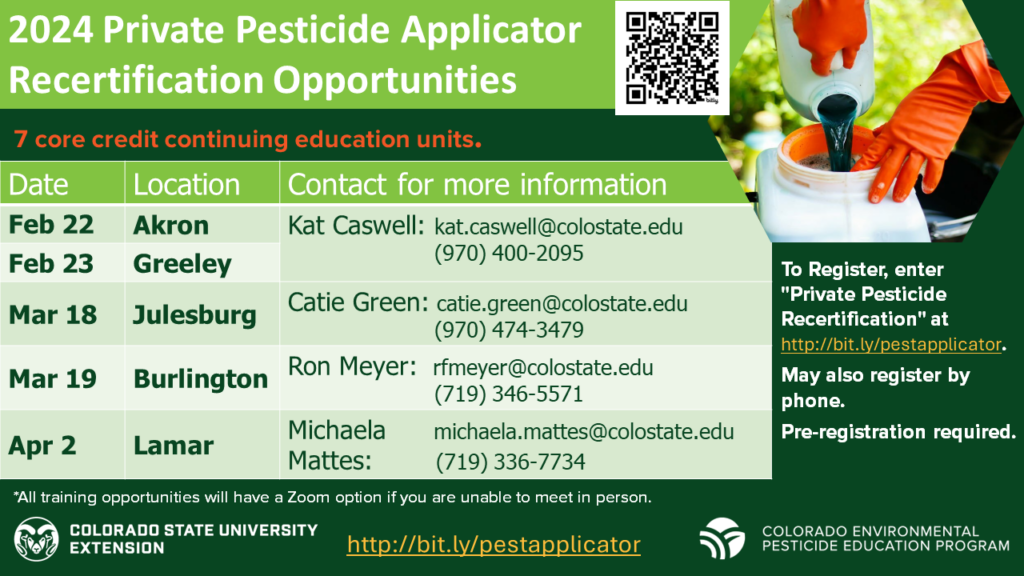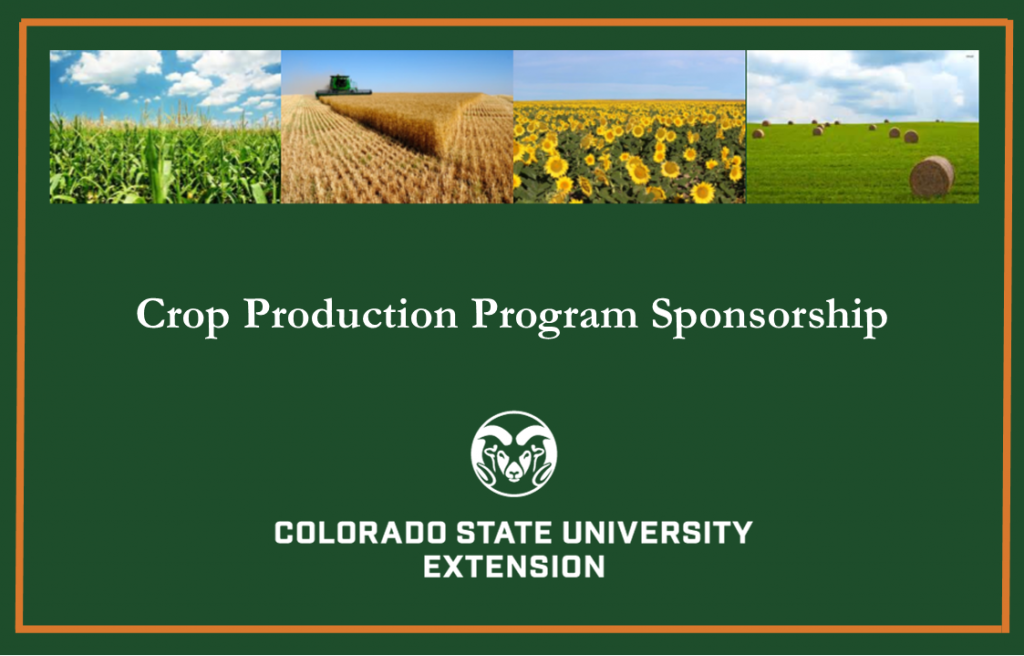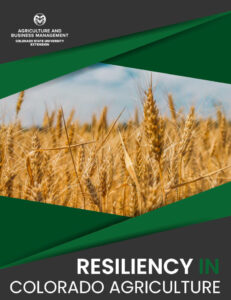
Agriculture and Natural Resources
The Golden Plains Area Extension Program is at the forefront on agronomic & water research. Our research spans crop production, irrigation efficiency, weed and pesticide management, crop insect control and monitoring, agricultural marketing and much more!

WINTER WORKSHOPS WITH AGRABILITY
The Colorado AgrAbility Project (CAP) is a partnership between Colorado State University Extension and Goodwill of Colorado. The program is funded in part by a grant from the U.S Department of Agriculture’s (USDA) National Institute of Food and Agriculture (NIFA) to provide information, education, and services to farmers, ranchers, agricultural workers and their families with disabilities, illnesses, or conditions. This unique collaboration promotes independence in production agriculture by helping workers find the help they need to begin, remain, or regain employment on their farm or ranch.
Thanks to the Colorado AgrAbility project, Colorado farmers and ranchers engaged in production agriculture are able to continue working, despite a long term illness, permanent injury, aging issues or other physical challenges.
Supportive Services Include:
- No-cost on-the-farm or ranch visits to help make your home, shop, farm or ranch more accessible
- Recommendations for farm equipment adaptation, home modifications, and adaptive equipment
- Resource referrals
- Educational workshops facilitated by CSU Extension for farmers, ranchers and family members with disabilities and the professionals who work with them

Sponsor Payment
News Articles
Changes Coming to Private Pesticide Applicator Certification
Jan 18, 2024 – The Colorado Department of Agriculture has made a change for private pesticide licensing. Private pesticide applicators who need to take licensing tests, or re-test due to license expiration, will now need to test at a proctored testing site. READ MORE
Pesticides and Re-entry
What is a restricted pesticide re-entry interval? This interval is the restricted-entry interval (REI) into a pesticide treated area. In other words, when is it safe to walk into a pesticide treated area. The REI can be different for each pesticide applied and crop applied. Some pesticides list different REI’s depending on the crop, application method, or the post-application activity (are workers hand hoeing or working on machinery in a field). Tank mixes occur when two or more pesticides are applied at the same time. In this case, the pesticide with the longer REI must be followed.
How do we find a pesticide’s REI number? All pesticides have a “label” listed on the container. The label is the law. The label contains important information such as what the pesticide is (the active ingredient), what the pesticide controls (which pests), how much pesticide to apply, and the Directions for Use section. The Directions for Use section will list the REI for the intended use. For many common pesticides the REI is 24 hours while some applications require 48 hours. The REI is different for each pesticide, application and crop. Always find a pesticide’s REI before entering into a treated area. After a pesticide application’s REI has expired, the area is considered safe for re-entry. REI’s for some of the typical pesticides used are 2,4-D 48 hours, Glyphosate 12 hours, Sevin garden insecticide 12 hours.
Source: www.epa.gov
Testing Dormant Wheat For Llife
Environmental conditions affect plant growth in many ways. Conditions that are too dry or too wet, too cold or too hot can all affect wheat production and survival. Determining whether wheat plants are alive in the spring due to adverse growing conditions should be done before spending production dollars on those acres.
Click Here for more information.
Tillage with No-Till?
Almost 3 million acres of Colorado farmland employs no-till strategies, and this acreage is expected to continue to increase. No-till farming has continued to gain momentum in the state due to a number of positive factors associated with this technique. Benefits of no-till include decreased soil erosion, increase soil moisture retention, decrease in fuel ussage associated with tillage, decreased labor costs from not tilling, increased soil carbon, and increased soil organic matter. Most of these benefits result in increases to farm income. However, crop production issues with no-till are showing up more frequently. Issues include herbicide resistant weeds (herbicides for weed control are substituted for tillage) and soil compaction problems.
Click here for more information.
Wheat Stem Sawfly
Wheat stem sawfly is a native insect that feeds on grasses in Colorado. The insect was first identified by entomologists in Colorado around the late 1800’s and primarily fed on range grasses. However, wheat stem sawfly emerged as a Colorado wheat pest in 2010 and damage from this insect has been expanding and increasing since. Today, this pest is estimated to cause $30 million in damage, according to Brad Erker, Executive Director of the Colorado Wheat Research Foundation. As a result, Colorado State University (CSU) is focused on addressing cropping strategies to ease pest losses to this insect. Research is focused on cropping rotations and developing wheat varieties that discourage wheat stem sawfly from reproducing and damaging plants.
Click here for more information.
Got Rye in Your Wheat
Feral rye, along with other annual grasses, are troublesome pests for wheat producers. Rye, along with jointed goatgrass and cheat grass, cost Colorado Wheat producers’ money annually in terms of reduced yield and increased dockage. However, a newer wheat production system termed CoAXium Wheat Production System is an option for wheat producers who have annual grassy weeds. The CoAXium wheat Production System is a herbicide tolerance technology based on a non-gmo AXigen wheat trait. The technology was developed at Colorado State University and is owned by the Colorado Wheat Research Foundation. CoAXium is the name for the production system, Axigen is the wheat gene, and Aggressor is the herbicide. Aggressor applied to CoAXium wheat varieties provides control of winter annual grasses such as feral rye, downy brome (cheat), and jointed goatgrass.
Click here for more information.
Colorado Department of Agriculture
Pesticide Applicator Certification and Licensing Program
The Certification & Licensing program promotes the safe and effective use of pesticides and certain devices to control pests such as insects, rodents, and weeds which may harm crops, livestock, beneficial organisms, structures and individuals through the certification of commercial and private pesticide applicators. The program protects the public and environment from the potentially adverse effects of pesticides that may result from unsafe and incorrect pesticide use.
Click here to find more information at CDA Plant Division
Certified Crop Advisors (CCA)

Contact: Kierra Jewell, CCA Representative
Each season a new group of professionals who voluntarily chose to enhance their skills and knowledge in the field of Agronomy qualify for becoming Certified Crop Advisors. CCA’s pass two comprehensive exams covering nutrient management, soil and water management, integrated pest management, and crop management. Along with contributing to the agronomic community and gaining the required experience, they commit to focus on grower profitability while optimizing and protecting our natural resources.
The International Certified Crop Adviser (ICCA) Program is the largest voluntary, agriculturally oriented certification program in North America. Over 13,000 agronomy professionals have met the standards-exams, experience, education, ethics-set by the American Society of Agronomy (ASA) to become certified.
If you have any questions about the CCA Program or would like to find a local CCA, please visit https://www.certifiedcropadviser.org or contact Kierra at (970)491-6201.

Click here for more information
GPA Agronomy Articles
Wheat
- Saving Wheat Seed
- CSU Wheat Decision Tree for Dryland and Irrigated Varieties
- 2020 Virtual Wheat Field Days
- Testing Wheat for Life
- Preventing Wheat Streak Mosaic
- Saving Wheat Seed
- Wheat Planting
- Wheat Seed Treatment Recommended
- How Weed Resistance Develops
Sunflowers
Pest Survey Updates
- Time to scout for western bean cutworm moth in Colorado
- Time for checking your alfalfa fields for weevils and webworm infestations
- 2020 Grasshopper populations in Colorado
More Information
- Do Plants Get a Virus?
- Certified Crop Advisors
- Dicamba Use Requirements
- Colorado Crops Testing Program
- USDA Reopens Continuous CRP Signup
- Economic And Environmental Potential Of High Plains Cover Crop
- Keeping Safety in Mind When Entering Grain Bins
- CSU Receives Grant for Crop Research
Agronomy Agent Corner
- Agronomy Agent Corner – Article 1
- Agronomy Agent Corner – Article 2
- Agronomy Agent Corner – Article 3
- Agronomy Agent Corner – Article 4
- Agronomy Agent Corner – Article 5
- Agronomy Agent Corner – Article 6
- Agronomy Agent Corner – Article 7
- Agronomy Agent Corner – Article 8
- Agronomy Agent Corner – Article 9
- Agronomy Agent Corner – Article 10
- Agronomy Agent Corner – Article 11
- Agronomy Agent Corner – Article 12
- Agronomy Agent Corner – Article 13
- Agronomy Agent Corner – Article 14
- Agronomy Agent Corner – Article 15
- Agronomy Agent Corner – Article 16
- Agronomy Agent Corner – Article 17
- Agronomy Agent Corner – Article 18
- Agronomy Agent Corner – Article 19
- Agronomy Agent Corner – Article 20








